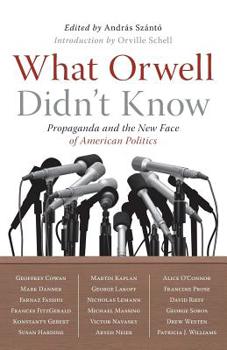What Orwell Didn't Know
Select Format
Select Condition 
Book Overview
Propaganda. Manipulation. Spin. Control. It has ever been thus--or has it? On the eve of the 60th anniversary of George Orwell's classic essay on propaganda ( Politics and the English Language ),... This description may be from another edition of this product.
Format:Paperback
Language:English
ISBN:1586485601
ISBN13:9781586485603
Release Date:November 2007
Publisher:PublicAffairs
Length:272 Pages
Weight:0.70 lbs.
Dimensions:0.6" x 5.6" x 8.3"
Customer Reviews
4 ratings
ALL THINGS ORWELL ARE MORE RELEVANT TODAY THAN EVER BEFORE
Published by Thriftbooks.com User , 16 years ago
What's left to be said, after that wonderful expose/review by Mr. Littrell. Nobody was better able to articulate to the masses the way political propaganda works and how people are taken in and conditioned with its sublte processes. But Orwell wrote "Animal Farm" and then "1984" and exposes in raw realistic detail exactly how political propaganda works (even as the reader himself is unsuspecting). Twenty writers combine in this informative anthology to examine the manipulation and lies thrust on the American people by a criminal Bush administration, Orwell style. Though a more thorough and important book, Don't Weep for Me, America: How Democracy in America Became the Prince (While We Slept) is available for seeing the evasive and magnitude of current political deception through the eyes of George Orwell, "What Orwell Didn't Know" is a good primer.
Against the corporate control of public consciousness
Published by Thriftbooks.com User , 16 years ago
"What Orwell Didn't Know" is an eye-opening compendium of pieces about the insidious use of propaganda in our time. Editor Andras Szanto presents outstanding works by eighteen intellectuals who compare Orwell's classic 1946 paper on propaganda, 'Politics and the English Language' (reprinted in its entirety) with the propaganda industry of today. Convincingly demonstrating how the science of propaganda has in fact metastisized into a very real threat to the Enlightenment ideal of progress, the authors implore us to sharpen our critical thinking skills as we seek to immunize ourselves to manipulation and struggle to keep our democracy alive. Part One: Language and Politics includes six essays about how deceptive language serves political ends. Orwell believed that clarity in writing was essential to reasoned discourse and understood that fear is the gateway to despotism. The authors connect these concepts to the Bush administration's well-documented misrepresentations that have led the U.S. into its perpetual war on terror. Among many insights, we learn how the deceptive use of language has allowed the corporate-controlled state to deepen its control over the public consciousness and impose a far right-wing political agenda. Part Two: Symbols and Battlegrounds contains six articles that explore how culturally-charged symbols are routinely exploited for political advantage. The authors discuss how post-Orwellian discoveries in cognitive sciences have demonstrated that reason is not just rational but emotional, complicating the task of disputation against the skilled propagandist. For example, the authors cite President Reagan's Star Wars proposal as an emotionally-appealing but unattainable solution to the overblown Communist menace that has distracted us from the real problem of nuclear proliferation. Similarly, the authors discuss how liberal causes such as women's rights and the environment have been revoiced in born-again Christian terms to the detriment of human progress and nature. Fortunately, the authors detect a growing challenge to the Christian Right by socially-conscious religious organizations and individuals such as Al Gore, whose cinematic jeremiad 'An Incovenient Truth' has succeeded in bringing attention to global warming by reframing the problem as a moral issue. Part Three: Media and Message consists of five compositions on the dangers of concentrated media ownership plus an Epilogue by George Soros. Writing before television came into maturity, Orwell's concerns about the printed word seems almost quaint when compared with the ubiquitously persuasive powers of television on the public mind. The authors are appalled with the rise of the postmodern infotainment industry and the media's stakeholder role in promoting the spectacle of disaster; others voice their concerns about the lack of diverse perspectives and self-censorship practices which makes it more and more difficult to reach broad consensus on critical issues. An
Great book!
Published by Thriftbooks.com User , 16 years ago
Very informative and thought provoking. Various authors give a 10-20 page essay on the topic from different angles. I gave several as holiday gifts to family and friends.
Riveting Must Read for all - especially now
Published by Thriftbooks.com User , 16 years ago
A book of galvanic essays written by noted journalists, authors, reporters, professors, and psychologists - What Orwell Didn't Know is truly a "must read" - especially before voting in the 2008 election. Prompted by the dismal state of "political discourse," today, five revered schools of journalism joined forces to create this anthology. Its 20 essays provide a vital resource to help readers and reporters alike to "disenthrall public debate from bias, hyperbole, bombast and lies." Along the way, it enlightens readers about everything from brain research and the psychology of emotion to the devastating impact of the "Orwellian" Postal Reogranization Act of 1970 on small, independent opinion journals and magazines; the tragic and ironic consequences of the administration's "subservience of truth to power" in Iraq and in the US; the "carnivalesque media economy," the threat of corporate power, and our own willingness to look the other way when the Emporer has no clothes. While I found a few of the 20 essays in the book somewhat less engaging, most were powerful, alarming, challenging and enlightening. And though Americans are more savvy today about the ways in which language can be manipulated and distorted for political ends, we can still be taken in....and we do ourselves, and our democaracy, a dangerous disservice if we do not question rigorously the medium, the message, the messenger the motives behind all we hear and read. "What Orwell Didn't Know" offers chilling evidence of our need for vigilance and action...I can't recommend it highly enough.





